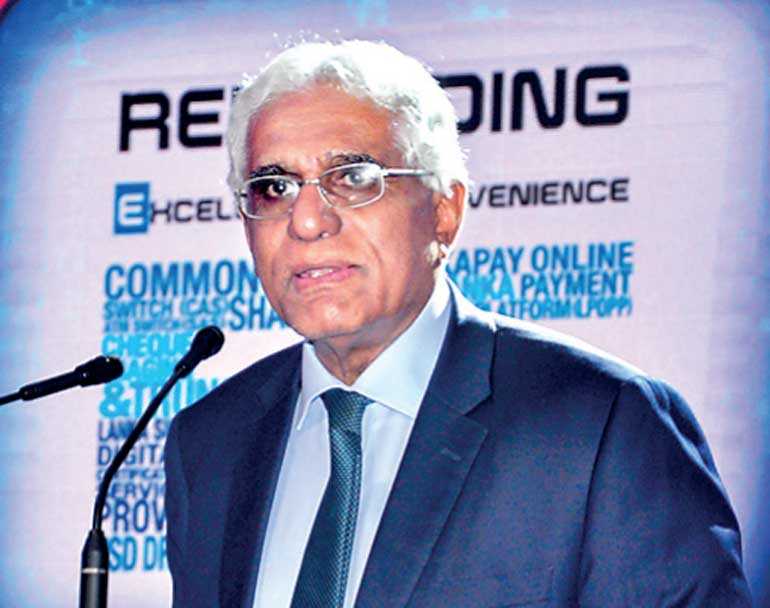Tuesday Feb 24, 2026
Tuesday Feb 24, 2026
Friday, 28 September 2018 00:00 - - {{hitsCtrl.values.hits}}
 Central Bank Governor
Central Bank Governor
Dr. Indrajit Coomaraswamy
By Charumini de Silva
To promote and encourage electronic payments, fees and charges should be reasonable or should not be a barrier, insisted Central Bank Governor Dr. Indrajit Coomaraswamy, to ensure efficiency and safety of payment and settlement systems of the country.
“The Current Merchant Discount Rate of international card schemes are high on 1.5% to 3%. Therefore, some merchants are reluctant to accept card-based payments,” he said, speaking at the second edition of the LankaPay Technnovation Awards 2018, organised by LankaClear Ltd. last Friday.
As the regulator and the catalyst of the payment settlement systems, Dr. Coomaraswamy said the Central Bank promotes new payment products, while engaging in regulating and overseeing them to mitigate associated risks.
He asserted that it was essential to ensure the full implementation of Common Card and Payment Switch (CCAPS) project, while also getting all stakeholders to facilitate the introduction of the National Card Scheme (NCS) as a measure to reduce transaction cost and costs incurred for payment cards.
“To reap the full benefit of new payment products, as a nation, we have a long journey to go. I believe Sri Lanka will benefit in many ways through the introduction of the NCS. The NCS initiative will also continue to reduce foreign currency payments to international cards schemes,” he added.
The Governor said LankaClear, under the guidance of the Central Bank, transformed the clearing systems of the country by introducing innovative technologies to improve the efficiency of retail payment mechanisms, driving Sri Lanka towards the objective of an efficient, green and paperless nation.
“LankaClear has laid a solid foundation in building an integral electronic payment system for multiple domestic payment networks through establishing the National Payment Switch,” he commended.
Outlining digitalisation of Government payments is another priority area, he said with the introduction of electronic payments to the Government sector, the payment and collection process of the Government will be streamlined, ensuring timely fund flows to the Government while reducing the cost of revenue collection.
The Governor said LankaClear Online Payment Platform implemented to Sri Lanka Customs will also be extended soon to other Government departments such as Inland Revenue Department, Board of Investment, Sri Lanka Ports Authority, Provincial Council Ministry and Local Government for e-local Government projects.
The Central Bank has been fostering industry collaboration for creating a strong institutional framework. “Sri Lanka’s digital payment innovation policies are spearheaded by the National Payment Council, which is an industry collaborative council comprising of stakeholders of all sectors. This council has sub-committees – the Fintech subcommittee, the Blockchain committee and the subcommittee to reduce cheque usage in Sri Lanka. The Fintech committee initiated in and has been developing the standardised National QR Code and a National Transit Card for Sri Lanka. The Blockchain committee is working to understand how the Blockchain technology can be used to improve financial services,” he added.
He insisted on the need to focus on security features and also customer protection when introducing new products. “While supporting the Fintech innovations we are also cognizant of the potential regulatory shortfalls. Thereby, the Central Bank has initiated the process to setup a Fintech Regulatory Sandbox for Sri Lanka, so that the bank can provide an environment that nurtures and promotes the advancement of fintech innovations while maintaining appropriate regulatory standards,” he emphasised.
Dr. Coomaraswamy also said the Central Bank is committed to achieve a balance between regulation and innovation, as it is responsible for the people and the Government for the safety and security of public funds, and therefore would be open for forms of regulated digital currency such as Digital Fiat Currency.
With the technological developments, he said, there is growing concern regularly on cyber security threats in the financial landscape. Financial institutions and payment and settlement systems are the key targets of cyber attackers, as they are the richest sources of confidential data.
He said with regards to payment and settlements landscape, the Central Bank is continuously aligning its infrastructure with the principles for financial market infrastructures (PFMI) issued by the Bank for International Settlement’s Committee on Payments and Markets Infrastructure, and the International Organisation of Securities Commission in Switzerland.
Pic by Sameera Wijesinghe